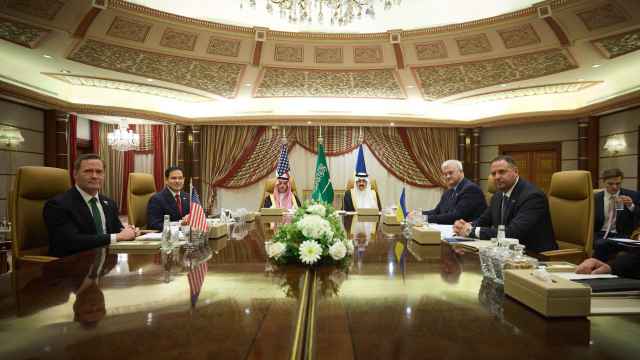VORONEZH — Raging wildfires spread across parts of western Russia on Saturday, engulfing 30 percent more land in just 24 hours, and Prime Minister Vladimir Putin described the situation as very difficult.
At least 28 people have been killed and 3,500 evacuated since the fires broke out in the hottest weather since records began 130 years ago. At least 1,260 houses have been burned down.
The area swept by peat and forest fires rose to more than 1,200 square kilometers from just over 850 square kilometers a day earlier, the Emergency Situations Ministry said.
The ministry said it was getting the fires under control and progress was being made in containing some of the most threatening blazes, but Putin said there were no grounds for optimism.
"In separate regions, where we were hit yesterday and the day before with harsh consequences, the situation has slightly improved," Putin said in a televised conference with officials from the region and victims of the fires.
"But as a whole, it remains very tense," he said.
A visibly angry Putin told the regional authorities that more could have been done to reduce the destruction caused by the fires, and he ordered the governors to rebuild people's burned-out homes quickly.
"In all of the affected regions — let me emphasize, in all — it is feasible to restore housing by the end of October," he told the governors, ordering them to report to Moscow on Monday afternoon for an emergency meeting.
A state of emergency has been declared in 14 of Russia's 83 federal districts, and 240,000 people have been deployed to fight the fires, media and officials said.
In villages outside Voronezh, a city some 500 kilometers south of Moscow and not far from the Ukrainian border, Saturday did bring respite and hope for some.
Fires that had blazed since Thursday, leaving nearly 600 people without a roof over their heads, were being subdued on Saturday as strong winds died down.
Firemen were hosing down charred and smoking tree trunks in a resort just outside the city where camp sites stood near gated mansions gutted by fire.
"Whatever could have been burned, has been burned," one fireman said.
President Dmitry Medvedev has sent the army to help tackle fires in European Russia, where sizzling temperatures hovering around 40 degrees Celsius have parched large tracts of farmland, ruining crops and pushing thousands of farmers to the verge of bankruptcy.
The Emergency Situations Ministry said the most difficult situations were in the Ural, Volga River and Central regions.
In Nizhny Novgorod, where at least 540 homes have been destroyed, villages and towns were still under threat from about 60 wildfires ranging in the area, the authorities said.
On Friday, Putin had ordered the government to allocate 5 billion rubles ($165 million) for fire victims, giving each of them 200,000 rubles ($6,600) from federal and regional budgets.
In Maslovka, a village just outside Voronezh that is one of the most badly burned places, Nikolai Borisov and Igor Vyushin were sifting through the rubble outside their burned-out homes.
Vyushin, 56, said he had heard they were also to receive 28,000 ($900) rubles per square meter of reconstruction work.
"If we receive what has been promised, that's great, but so far we have nothing," Vyushin said, as sweat streamed down his face beneath a makeshift cap of burned newspaper in the 42 C weather.
Firefighters have brought wildfires under control in some parts of Russia, but new fires are breaking out elsewhere.
The wildfires that began threatening much of western Russia last week have killed at least 28 people and destroyed or damaged 77 towns or villages. Thousands have been evacuated from areas in the path of encroaching flames.
In the southern Voronezh region, one of the worst hit, officials said Sunday the fires are under control and no longer threaten any population centers.
But Emergency Situations Ministry spokeswoman Yelena Chernova said new fires are breaking out elsewhere, particularly in the Mordovia region and around the industrial city of Togliatti.
(AP)
A Message from The Moscow Times:
Dear readers,
We are facing unprecedented challenges. Russia's Prosecutor General's Office has designated The Moscow Times as an "undesirable" organization, criminalizing our work and putting our staff at risk of prosecution. This follows our earlier unjust labeling as a "foreign agent."
These actions are direct attempts to silence independent journalism in Russia. The authorities claim our work "discredits the decisions of the Russian leadership." We see things differently: we strive to provide accurate, unbiased reporting on Russia.
We, the journalists of The Moscow Times, refuse to be silenced. But to continue our work, we need your help.
Your support, no matter how small, makes a world of difference. If you can, please support us monthly starting from just $2. It's quick to set up, and every contribution makes a significant impact.
By supporting The Moscow Times, you're defending open, independent journalism in the face of repression. Thank you for standing with us.
Remind me later.




